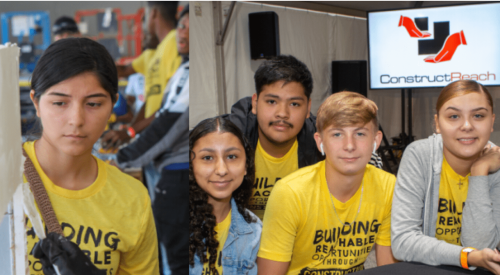The construction industry is suffering from a talent shortage as many older construction workers begin to retire and little new talent is entering the field to fill the gaps. With a healthy economy and a surge in new projects, the construction industry must take steps to attract new talent by making sure a career in construction is seen as a viable option.
According to the Bureau of Labor Statistics, Millenials are expected to make up 50% of the workforce by 2020. However, what Millennials are looking for in jobs is shifting as they begin to prioritize more than just compensation and traditional benefits. Younger generations want to belong to organizations that encourage creativity and innovation, celebrate diversity, and offer continuous learning and career opportunities. According to the 2018 Deloitte Millennial Survey, 81% of Millennials believe continuous professional development opportunities will not only help them excel at work but also keep them engaged over time. With this in mind, construction leaders need to reevaluate what makes them attractive to those entering the workforce.
Here are three steps the industry can take to attract Millennial talent:
1. Roll Out New Hiring Practices
A rampant misconception in construction is that companies must prioritize technical skills when hiring candidates. This myth often causes hiring managers to overlook candidates who don’t have experiences that perfectly match the role they’re looking to fill—resulting in a revolving door of talent. Instead, construction companies should focus on hiring based on behavioral and cognitive fitness that ensures the candidate is both wired to do the job innately and has the capacity to learn the necessary technical skills quickly. This not only creates career paths that were previously inaccessible, but it also allows all employees to discover and hone their passions.
2. Reevaluate Company Culture
Construction companies should focus on ways to consistently engage their employees by offering ongoing training opportunities and mentorship programs, as well as sharing clearly defined roles and responsibilities to inform employees as they move up the corporate ladder. Employees who feel connected and passionate about what they’re creating, for example schools or family homes, will feel more fulfilled by their work. By addressing the employee experience and changing the culture to one that places emphasis on what employees are creating, organizations will drive people to put their hearts into their work, ultimately changing the perception of these industries for the better.
3. Lead with integrity, It will give people a reason to stay
A recent report found that the number one driver of employee engagement in the construction industry was related to having a great manager. According to the research, people in the construction industry tend to leave bad companies and bad managers, especially when they don’t trust the leadership. Setting Millennial employees up with a strong mentor who is connected with their specific career trajectory from the beginning will make them feel integral to the company and help attract more young talent searching for purpose in their career.
By addressing talent gaps through a holistic approach, and by adopting a talent optimization strategy, the industry will be able to achieve optimal business results. The benefits of improved hiring practices, realigned culture, and improved leadership development, will lead to younger generations joining the industry and an increased talent pool.












